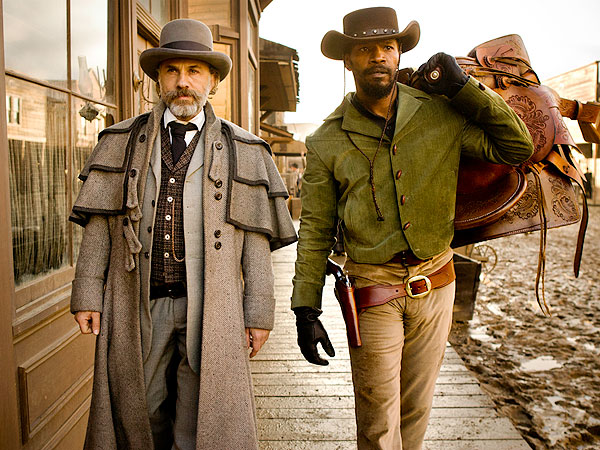 Django Unchained, Quentin Tarantino’s latest bloodfest, explores slavery, revenge, love, loyalty, and friendship. It’s a pre-Civil War Western set in the times of slavery when Northerners had very different viewpoints about race and freedom than their Southern counterparts. There’s heaps of violence, stellar acting (more on that later), classic QT quips, diverging dialogues, and beautiful cinematography. It’s quite possibly everything one could ask for in a Tarantino flick. So why am I left feeling underwhelmed?
Django Unchained, Quentin Tarantino’s latest bloodfest, explores slavery, revenge, love, loyalty, and friendship. It’s a pre-Civil War Western set in the times of slavery when Northerners had very different viewpoints about race and freedom than their Southern counterparts. There’s heaps of violence, stellar acting (more on that later), classic QT quips, diverging dialogues, and beautiful cinematography. It’s quite possibly everything one could ask for in a Tarantino flick. So why am I left feeling underwhelmed?
The story follows a newly freed slave, Django (Jamie Foxx), and his bounty hunting partner, Dr. King Schultz (Christoph Waltz), as they tour the country finding and killing wanted criminals for handsome bounties. With money lining their pockets, Django and Schultz set out to rescue Django’s wife (Kerry Washington) from the cruel hands of a perverse plantation owner (LEO!) and “mandingo fighting” enthusiast (it’s like cock fighting except with male slaves – no big deal).
The film has lots working in its favor. Partly shot in Louisiana and Wyoming, the rural settings used in the film produced some really breathtaking exterior scenes. With violence percolating left and right, Tarantino remains dedicated to giving the audience a visually stunning, light-hearted (given the subject matter), and quite entertaining film. You never watch the same gun slingin’ shootout twice because the camera is always doing something quirky and unique. The director’s style never fails to leap off the screen.
And the acting! It’s refreshing to see Leonardo DiCaprio taking on a villainous role so completely different from his staple gigs – especially since he knocked it out of the park. As the two-faced Calvin Candie, DiCaprio transformed from charming Southern gentleman to an evil, maleficent torturer like some sort of nineteenth century Jekyll and Hyde, flashing a devious smile that hides the many secrets of his slave-ridden plantation. Samuel L. Jackson is also excellent as Stephen, Candie’s right hand man, who seems more loyal to his white owner than his fellow servants. Jackson plays the miserable, tattling curmudgeon brilliantly – and it looks like he had a blast doing so.
As for Christoph Waltz, his Best Supporting Actor nomination says it all. Dr. Shultz is the direct opposite of Waltz’s other Tarantino character, Colonel Hans Landa (Inglourious Basterds). He’s kind-hearted, logical, and you know, not an elitist, racist, egotist, or Nazi. Schultz frees Django, taking him into his command, returning his freedom, and even becoming his trusted ally. Schultz’s allegiance to Django throughout tugs subtlety at your heartstrings and makes you love the character and love the man portraying him. Many are hailing Jackson as the star here, but I digress.
Though enjoyable, Django didn’t really rustle my feathers. Jamie Foxx was just OK as the taciturn lead character, and Django’s story wasn’t as vengeful or exciting as say, The Bride’s in Kill Bill, or Shosanna’s in Basterds. Perhaps there lies my struggle: Tarantino’s resume is mindfuckingly amazing. Maybe the passion and excitement I felt walking away from Death Proof and Bill can’t be topped. Is it fair of me to critique this film based on the director’s other works? Probably not. Django didn’t feel incomplete, nor unworthy to sit amongst the Bills, Fictions and Dogs of the past, but it certainly didn’t resonate any deeper than surface-level entertainment with this QT fan.
But those performances, man. Wow.
Grade: B-


